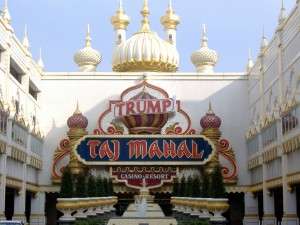Trump Taj Mahal Teetering on Edge of Bankruptcy
Living in Atlanta, I’m more than happy that the hit television show, “The Walking Dead,” films in this area. Perhaps, however, the show’s muckety-mucks should consider shifting the filming to Atlantic City. If things don’t get turned around there soon, the gambling capital of the east coast could become a ghost town. The latest in a string of bad news: the Trump Taj Mahal could be on its way to bankruptcy.
According to a report by Josh Kosman in the New York Post yesterday, the Taj, as it is often called, has broken some of its loan covenants and needs to come up with a deal to satisfy its creditors. One possible solution looks like it has already dropped by the wayside: Carl Icahn, who hold much of Trump Entertainment’s debt, likely will not agree to convert the debt into equity.
If no solutions can be hammered out with creditors soon, the Trump Taj Mahal may have to file for Chapter 11 bankruptcy. Now, the silver lining in this situation is that, unlike the commonly held perception, Chapter 11 does not necessarily mean that the Taj will go up in a puff of smoke. In Chapter 11 bankruptcy, the debtor (in this case, the Taj Mahal) usually retains control of the business’s operations and gets the chance to cancel contracts and restructure its financial obligations. In exchange for the break it is being given, the debtor gives up control over most major decisions to the bankruptcy court. Basically, Chapter 11 is a way to allow the debtor to figure out how get out of its financial pickle while still keeping the business alive. 
Contrast this with Chapter 7, which liquidates the business, giving the proceeds to its creditors. Nobody wants to file for any type of bankruptcy, but Chapter 7 is the grim reaper of the bankruptcy family.
The Trump Taj Mahal has been a fixture in Atlantic City for two-and-a-half decades. Along with the Borgata, it has been one of Atlantic City’s key poker hangouts, a proving grounds of sorts for local and regional players. From 1996 through 2010, it was the home of the United States Poker Championship (USPC), one of the more prestigious poker stops in the U.S. not named the World Series of Poker or the World Poker Tour. The tournament was nationally televised for a number of years during the poker boom of the previous decade, with winners such as Daniel Negreanu (before anyone really knew who he was), Men “The Master” Nguyen, John “Johnny World” Hennigan, and Toto Leonidas. Both John Juanda and Erik Seidel were two-time runners-up. One little known highlight of the USPC came in 2005 when James Caporuscio and Ralph Pecorale played heads-up for the title. The two were close friends who played in the same home game. If my memory serves (which it probably doesn’t, though I was in attendance at the tournament), one of them had won the buy-in for his seat in said home game and the other decided to play on a whim. It was as jovial of a heads-up match as you will ever see with each player rooting the other on – Caporuscio eventually triumphed.
Atlantic City has been having a terrible 2014. The Revel, Showboat, and Atlantic Club casinos have already closed this year and the Trump Plaza will shutter its doors in less than two weeks. The year started with a dozen casinos in Atlantic City and will likely end with just eight open for business.
According to the New Jersey Division of Gaming Enforcement’s July report, total casino win, excluding the Atlantic Club, was down 6.6 percent in July 2014 as compared to the same month last year. The Trump Taj Mahal had a total casino win (slot machine plus table games) of $21,689,907, placing sixth out of the eleven casinos counted on the report. This was a steep 18.4 percent decline from the $26,583,548 the casino brought in from gaming in July 2013. The Trump Taj Mahal’s total casino win for the first seven months of this year was $131,142,317, a 15.6 percent drop from the same period in 2013.
The casino added $587,042 in internet gaming revenue in July, bringing its 2014 total to $4,318,594. The Trump Taj Mahal has partnered with Ultimate Poker to offer online poker to residents of New Jersey, but has had trouble making much of a dent in that arena. Through July, the Taj has only scraped together $428,222 in online poker revenue, just two percent of the entire New Jersey internet poker market.
The New York Post reports that “until recently,” the Taj Mahal employed 5,000 people, implying that the number is now smaller. Around 6,000 people have been sent into unemployment with the closures of the Revel, Showboat, and Atlantic Club casinos, with another couple thousand about to be sent home when the Trump Plaza shuts down.



















COMMENTS